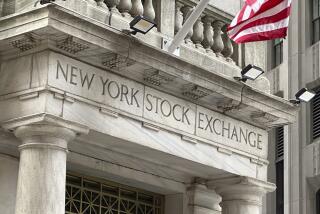Bigger Profits Aren’t Boosting Share Prices : Economy: After four years of falling earnings, corporate Japan is coming back. Investors, however, greeted good news with yawns.
- Share via
TOKYO — Japanese camera maker Minolta Co. finally turned it around this year.
The company trimmed its payroll by 1,300 workers. It built factories in Malaysia, China and Brazil, where wages are low, and cut production in Japan, where wages are high. And last week, it unveiled a new copier that works even with books that are lying face up.
The payoff: Minolta racked up its first midterm profit in four years. The company’s performance was almost three times analysts’ estimates.
But Tokyo investors responded with a resounding yawn. Minolta’s stock has fallen more than 4% since it announced the good news.
“We have done everything we could to cut production and labor costs,” said Ichiro Shidai, a Minolta spokesman. “But in Japan, stocks don’t always respond, no matter how good profits are.”
Rarely has that been more true than this month, when most of Japan’s publicly listed companies announce their half-year earnings. After four years of falling profits, corporate Japan is coming back. And yet Japan’s stock market has been heading south.
Minolta is not the only company pondering the conundrum of rising profits and falling share prices.
Jamco Corp., which builds toilets for Boeing airplanes, stunned analysts by announcing a current profit of $3.5 million for the half-year that ended in September. That was almost seven times forecasts. But Jamco’s stock has risen less than 1% since the announcement.
Takasago International, which provides sweet smells for Procter & Gamble products and grapefruit juice flavoring for a popular Japanese sports drink called Pocari Sweat, announced profits of $28.8 million. That beat estimates by 77%. Its shares have fallen 2% since the news.
Plastics processor Takiron Co. has seen its shares fall 3% despite profits that were 110% higher than expected.
As Japan’s midyear earnings season peaks today, with some 350 companies reporting, the story has been the same across industries.
So far, Nikkei 225 companies have reported current profits 10% higher than earlier estimates, and they are expecting accelerated growth in the second half of the fiscal year.
Investors, traders and analysts say they have been waiting for just those kinds of positive numbers to breathe some life into Tokyo’s ailing market. Instead, the Nikkei has fallen 3.3% since the earnings season began a month ago.
“We’ve got an unhealthy market that is not responding to good news,” said Scott Callon, chief market strategist at BT Asia Securities Ltd. “This market has a fundamental problem right now. It’s called ‘no buyers.’ ”
Where are the investors, and why aren’t they responding to positive numbers? Analysts, traders and investors themselves say they are still uncertain about the Japanese economy, and earnings figures haven’t helped clear their vision.
“We thought the shining earnings figures would be enough to attract investors back,” said Minoru Maeda, general securities portfolio manager at Yamaichi Investment Trust Management Co. “But domestic, especially individual, investors are paralyzed. They have been burned so many times that they are afraid to believe the numbers.”
Analysts say investors are held hostage by the yen’s strength, rising interest rates and skepticism about earnings. And until these negatives disappear, the market is likely to remain immune to good news.
The yen’s strength has been the biggest concern. Japan’s economy is powered by exports. So when the yen rises, earnings fall.
Japan’s major exporters--Sony Corp., for example, or Nissan Motor Co.--have projected profits with the assumption that the dollar will be trading at 100 yen. The dollar is currently trading at 98 yen, and investors are worried it could tumble again to depths below 96 yen.
Another reason stocks haven’t responded is that investors think revenues got an unusual boost from a record-breaking heat wave this summer.
Consumption soared as people scrambled to buy air conditioners, summer clothes and cold beverages to battle temperatures that reached 104 degrees Fahrenheit.
“The market thinks it was a one-time boost in beverage sales that lifted our earnings,” said Masaru Takada, managing director at Takasago International. But he said Takasago has also benefited from cost reduction and increasing production abroad.
Stock prices were underpinned by hopes the summer surge in consumption would trigger a strong rebound in Japan’s economy. But spending has slowed, leaving investors unsure whether current earnings just reflect more thirsty sunbathers.
“It’s like a hangover after the strong numbers over the summer,” said Tim Hayashida, strategy associate at Merrill Lynch Japan Inc.
Ultimately, the problem is that stock prices are too high. They were pumped up by foreigners who were overly optimistic about Japan’s economic prospects, government fund managers who have used public money to prop up the market and brokerage dealers who try to blow up every increase into a rally.
More to Read
Inside the business of entertainment
The Wide Shot brings you news, analysis and insights on everything from streaming wars to production — and what it all means for the future.
You may occasionally receive promotional content from the Los Angeles Times.










